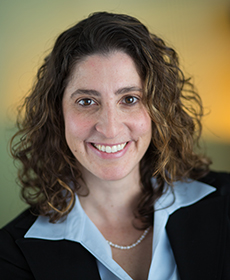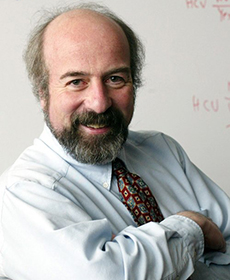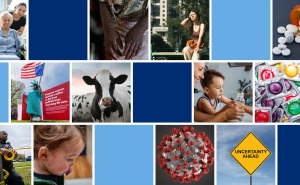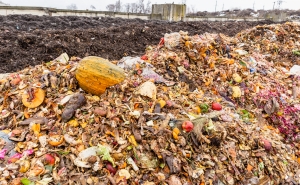How Bloomberg School Researchers are Confronting Cancer
Observed on February 4, World Cancer Day seeks to "unite the world's population in the fight against cancer." Here's how six JHSPH researchers are confronting cancer on diverse fronts.

Tobacco
Joanna Cohen
Health, Behavior and Society, Institute for Global Tobacco Control, Bloomberg Professor of Disease Prevention
Cohen's research focuses on the factors that affect the adoption and implementation of public health policies and on evaluating the beneficial effects and the unintended consequences of such policies. Trained in epidemiology and health policy, Cohen has worked on studies of both U.S. and Canadian legislators regarding tobacco and tobacco control policy, a longitudinal cohort of smokers focusing on factors influencing quitting behavior, tobacco promotion at the point of sale, tobacco prices including taxes, tobacco packaging, options for reducing the physical availability of tobacco products, and tobacco industry interference in tobacco control.
- Biomarkers of Secondhand Smoke Exposure in Waterpipe Tobacco Venue Employees in Istanbul, Moscow and Cairo
- Internet Search Query Trends Reveal Significant Public Health Interest in Heat-Not-Burn Tobacco Products

Informing Risk
Gypsyamber D’Souza
Epidemiology, International Health
Amber D'Souza focuses on infectious causes of cancer. Her current research focuses on health of high-risk groups, communication of risk, and translation of epidemiologic findings. She leads a research program related to human papillomavirus-related cancers, including screening, prevention, and survivorship issues for oropharyngeal, cervical and anal cancers. She also studies cancer among people living with HIV and co-leads the MACS-WIHS Combined Cohort Study datacenter. D'Souza is involved in several large collaborations and advisory groups focused on building study populations and scientific infrastructure for team science, communicating expert opinion and informing both public and policy.
- COVID-19 Vaccination for Patients with Cancer While Vaccine Supply is Limited
- Disparities in Cancer Prevention in the COVID-19 Era
- Long-term Persistence of Oral HPV Over 7 Years of Follow-up
- Unique Role of HPV16 in Prediction Oropharyngeal Cancer Risk More Than Other Oncogenic Oral HPV Infections

Environmental Carcinogens
John Groopman
Environmental Health and Engineering, Center for Human Nutrition
The research in Groopman’s program involves the development and application of molecular biomarkers of exposure, dose and effect from environmental carcinogens, including naturally occurring agents in the diet as well as those produced as a result of cooking practices. A major emphasis of the research has been in the elucidation of the role of aflatoxins, a common contaminant of the food supply, in the induction of liver cancer in high-risk populations living in Asia and Africa. This work has led to the identification of a strong chemical-viral interaction between aflatoxin and the human hepatitis B virus in the induction of liver cancer. These biomarkers have also been used in many collaborative molecular epidemiology studies of liver cancer risk and recently employed to assess the efficacy of a number of chemopreventive agents in trials in high-risk aflatoxin-hepatitis B virus–exposed populations. This research is now being extended to develop genetic biomarkers of p53 mutations and viral alterations in human samples as early detection of disease biomarkers using a novel mass spectroscopy–based method for genotyping developed in the laboratory. Thus, the research in Groopman’s laboratory focuses on the translation of mechanistic research to public health based prevention strategies. Most recently, Groopman contributed to the just-released World Cancer Report from IARC/WHO.
- World Cancer Report: Cancer Research for Cancer Prevention
- Liver Cancer on the Rise, Aflatoxin Contributes
- Detoxification of Air Pollutants in Humans with a Broccoli Supplement

Viral Infections
Greg Kirk
Epidemiology, AIDS Linked to the Intravenous Experience (ALIVE), Center for AIDS Research, Center for Global Health, Johns Hopkins University Global mHealth Initiative
Kirk’s research focuses on understanding the natural history of viral infections, particularly HIV and hepatitis viruses, and how they contribute to the development of cancer and other chronic conditions. In Baltimore, Kirk and colleagues have leveraged the SHIELD (Study of HIV Infection in the Etiology of Lung Disease) cohort to define how HIV increases risk for lung cancer and obstructive lung disease, independent of smoking. Utilizing data from 22 cohorts in North America, trends in hepatocellular carcinoma (HCC) incidence rates have been increasing among persons living into older ages with HIV; increased risk was identified with greater immunosuppression and HIV viremia. In partnership with international collaborators in Uganda and Senegal, Kirk has demonstrated the increased risk for HCC independently associated with multiple infectious diseases, including HIV, hepatitis B and C viruses, and Schistosomiasis. On-going projects are evaluating the impact of treatments for each of these infections on reducing HCC risk. The long-term goal of this research is to translate this information into targeted interventions to help reduce the burden of cancer and other chronic diseases related to these infections. The North American study on liver cancer will be published later this month.

Inflammation and Cancer
Elizabeth Platz
Platz is a cancer epidemiologist whose research on prostate and colon cancers sits at the interface of epidemiology and basic science. Within prospective cohorts, she studies the association of genetic and epigenetic factors as well as circulating markers of androgenicity, inflammation and oxidation with prostate cancer incidence and recurrence. For colorectal neoplasia, her work focuses on metabolic syndrome, growth factors and inflammation as sequelae of adiposity. She also studies the role of modifiable factors that influence these pathways, such as diet and lifestyle, in relation to the incidence of these diseases and other men’s health concerns. In addition, she studies these factors in association with benign conditions of the prostate and colon, including benign prostatic hyperplasia and adenomatous polyps. She has a long-standing interest in uncovering explanations for the notably higher rate of prostate cancer in African-American compared to white men, including racial variation in sex steroid hormones in the in utero milieu and throughout life.
- Aspirin and Non-Aspirin NSAID Use and Prostate Cancer Incidence, Mortality, and Case Fatality in the Atherosclerosis Risk in Communities Study
- The Association of Clinically Determined Periodontal Disease and Edentulism with Total Cancer Mortality

Global Cancer Disparities
Anne F. Rositch
Epidemiology, Center for Global Health
Anne F. Rositch is an applied epidemiologist, concentrating on cancer in women and global cancer disparities, with a background in basic science and experience conducting international field-based research. For over 10 years, her research has focused on cervical cancer in HIV-positive individuals and aging women and in low-resource settings. It has spanned the translational spectrum from epidemiological studies to understand the natural history of the disease, to studying the effectiveness and implementation of cervical cancer prevention in low-resource settings. Rositch is currently leading two new Susan G. Komen funded research studies, focusing on improving breast cancer care and control in Tanzania. The “Time to A.C.T.” study takes an implementation science approach to Assess the local context for breast cancer, Couple the data to stakeholder-identified solutions, and Test those strategies to improve breast cancer care and control in Mwanza, Tanzania.
- Time to ACT - Implementing Strategies for Breast Cancer Control in Africa
- The Role of Dissemination and Implementation Science in Global Breast Cancer Control Programs: Frameworks, Methods, and Examples
Rositch is also part a team working on developing effective, scalable, and sustainable cervical cancer programs in Peru, funded by the National Cancer Institute. Studies like this are essential to informing strategies towards the WHO cervical cancer elimination goal.
- Proyecto Precancer
- Integrative Systems Praxis for Implementation Research (INSPIRE): An Implementation Methodology to Facilitate the Global Elimination of Cervical Cancer
Rositch's newest project focuses on reducing disparities in cancer care in Baltimore for Johns Hopkins patients. It is funded by the American Cancer Society.
Related:
- The Patient Researcher: When survivors and scientists meet in Anthony Leung’s lab, it’s clear that cancer research isn’t just about molecules.
- Bridging Cancer’s Great Divide: Six epidemiologists seek to eliminate disparities in cancer incidence and outcomes.





